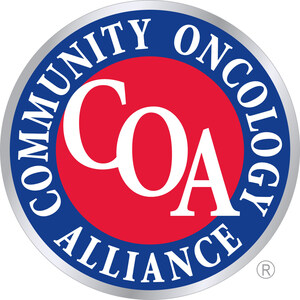Devastating 21% SGR Cuts to Medicare Disproportionately Impact Cancer Care
Cancer Patients, Doctors, Nurses Visit Capitol Hill Today to Tell Members of Congress 'Stop the Cancer Care Cuts'
WASHINGTON, June 23 /PRNewswire/ -- Today a group of cancer patients, oncologists, oncology nurses and practice administrators will meet with Members of Congress to speak out about the enormous burden placed by the massive Medicare cuts to U.S. cancer care, and to offer solutions.
Community oncologists are warning that the failure of Congress to address 21.3% Medicare reimbursement cuts due to the Sustainable Growth Rate (SGR) formula – which disproportionately affect cancer care – will devastate the country's cancer delivery system and force many oncology practices to stop accepting new Medicare patients.
"This is an egregious problem bringing further jeopardy to every community cancer clinic's ability to sustain care to cancer patients for both the long term and very short term," said Patrick Cobb, M.D., president of COA and managing partner of Hematology-Oncology Centers of the Northern Rockies in Billings, Montana. "These delays in resolving the 21 percent SGR cuts to all physicians have created problems for most U.S. doctors. Unfortunately, oncology practices are unfairly impacted at an even higher rate. We are seeing community oncology offices cutting staff, services, and closing at a much faster pace since the beginning of 2010."
Cancer is now the number one killer of Americans under age 85, yet no other specialty is as deeply affected by these severe cuts and delays in reimbursement as oncology. Unlike other areas of medicine:
- oncology practices have millions of dollars in month-to-month drug outlays for chemotherapy drugs required to treat patients;
- since 2004 there have also been significant year-over-year Medicare cuts specific to oncology, which have placed many local practices in jeopardy; and
- half of all cancer patients are Medicare patients, so a significant amount of the oncology practice's operating income is placed on hold during delays with resolving the SGR.
According to a USA Today report out this week, the number of doctors refusing new Medicare patients is at a record-setting rate. This is happening mere months before millions of Baby Boomers enter the Medicare rolls. According to internal COA polling data, this may sadly be the case for many oncology practices as well.
"No community oncologist wants to turn away Medicare patients, or any patients for that matter," continued Dr. Cobb. "So for the past few years they've been holding on as long as they can, essentially paying out-of-pocket to treat certain patients, and then going out of business. This unfortunately affects the entire community, and some communities have no other cancer treatment alternative."
In addition to this week's press reports, COA's own internal polling data shows that without a resolution to the SGR problem, a whopping 80% of responding oncology practices would either limit, stop accepting new Medicare patients, or halt treating Medicare patients altogether.
According to COA executive director Ted Okon, "We conducted an online poll to ascertain what oncology practices would do if the SGR cuts went into effect. What we saw was shocking, but not surprising. Out of the more than 300 practices who responded, representing 2,200 oncologists, a full 20 percent said they would likely stop treating Medicare patients altogether. Another 30 percent said they would stop accepting new Medicare patients and 30 percent said they would reduce the number of current Medicare patients treated. That is a complete shift away from the way that community oncology has operated in this country to date, and it must be prevented."
About Community Oncology Alliance (COA)
Formed in 2003 in response to the Medicare Modernization Act, COA is a non-profit organization dedicated solely to community oncology. COA was founded by community oncology to advocate for patients and providers in the community oncology setting, where 84 % of Americans with cancer are treated.
Currently, COA is working with the Congress in providing proactive solutions designed to protect the viability of the nation's cancer care delivery system and patients' access to quality, affordable cancer care. The cancer death rate in the U.S. has declined due to earlier detection, the quality of treatment, and the accessibility of cancer care. However, according to the American Cancer Society, men still have an approximately one in two lifetime risk of developing cancer, with a risk of one in three for women. For more information, please visit www.communityoncology.org.
SOURCE Community Oncology Alliance
WANT YOUR COMPANY'S NEWS FEATURED ON PRNEWSWIRE.COM?
Newsrooms &
Influencers
Digital Media
Outlets
Journalists
Opted In





Share this article